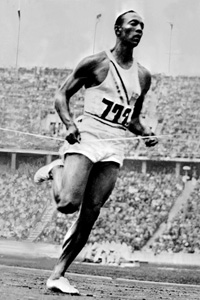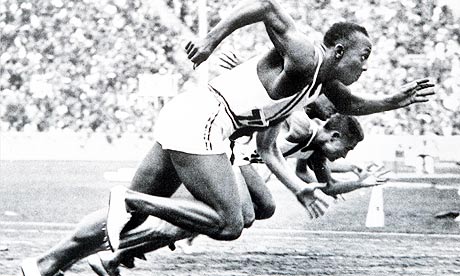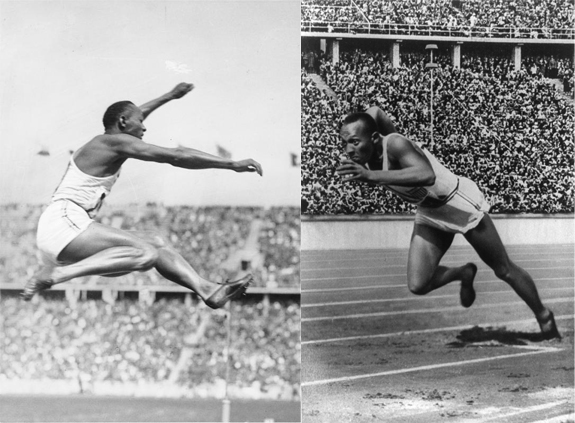UpNorth_Buckeye
Assistant Coach
Buckskin86;1909949; said:
I don't know why, but that made me laugh it little bit. Just the way Archie feels the need to whisper maybe.
Upvote
0
Follow along with the video below to see how to install our site as a web app on your home screen.

Note: This feature currently requires accessing the site using the built-in Safari browser.
Buckskin86;1909949; said:
Updated: August 6, 2011
Owens remains the ultimate Olympian
By Jeremy Schaap
Special to ESPN.com
On June 19, 1936, six weeks before the Opening Ceremony of the Games of the XI Olympiad in Berlin, a washed-up former heavyweight champion named Max Schmeling knocked out Joe Louis, the top-ranked contender who had seemed indestructible.

Getty ImagesJesse Owens won four gold medals at the 1936 Berlin Olympics (100 meters, 200, 400 relay and long jump).
It was big news, a propaganda boon for the Third Reich, which had never embraced Schmeling because everyone, even the Germans, assumed Louis would crush him. But Schmeling had detected a flaw in Louis' style -- he would drop his guard after throwing a jab -- and made the American suffer for his sloppiness. Unexpectedly, the world heavyweight championship, the biggest prize in sports, was within the grasp of a citizen of Hitler's Germany, and the most prominent black athlete on the planet had suffered a humiliating defeat.
Black Americans, in particular, felt the sting of Schmeling's punches; in Louis, they had a black heavyweight who had been given the chance to prove his superiority in the ring and had demonstrated an unmatched combination of power and skill until that night at Yankee Stadium. Twenty-one years had passed since Jack Johnson lost the title to Jess Willard and even black Americans were ambivalent about Li'l Arthur, with his flashy cars and white women. But Louis was different, quiet and strong and uncontroversial, and now he had been humbled. Disappointment floated in the air from Harlem to Watts.
Cont...
Jesse Owens 1936 Berlin Olympics celebrates 75th anniversary
posted by shannonowens on August, 9 2011

Jesse Owens (former US Olympic track star), right, with Lutz Long of the host German team, 1936 Olympics.
It was 75 years ago today that Jesse Owens won his fourth gold medal in the 1936 Berlin Olympics and shamed Nazi leader Adolph Hitler.
This day in sports history?August 9: Jesse Owens wins
By William Browning, Yahoo! Contributor Network
In the history of sports, Aug. 9 also has some history behind it thanks to some iconic figures.
Jesse Owens Wins Fourth Gold Medal
At the 1936 Olympics, German leader Adolf Hitler wanted to prove the superiority of the Aryan race. American Jesse Owens had other ideas. After winning two sprint races and the long jump, Owens was a part of the 4x100 meter relay team. On Aug. 9, 1936, Team USA set a new world record of 39.8 seconds, a mark that would hold for 20 years in the relay event.
Owens was lauded as a hero to the German people who had been under the auspices of Hitler for three years. Owens would partake in running exhibitions against horses and motorcycles to earn money. He received the Presidential Medal of Freedom in 1976. His record four gold medals would stand until 1984 when Carl Lewis tied Owens' mark.
Rumors about a tree Jesse Owens planted on the OSU campus have been widely circulating.
In the film ?Jesse Owens Returns to Berlin,? Owens himself suggests that such a tree exists: "And one stands among the cherished mementos on All-American Row at Ohio State University, where I spent my college days." However, the university archives have no supporting evidence for the matter. Actually, nobody has any proof yet.

ASSOCIATED PRESS
In this Aug. 11, 1936 file photo, Jesse Owens of the U.S., center, salutes during the presentation of his gold medal for the long jump, after defeating Nazi Germany's Lutz Long, right, during the 1936 Summer Olympics in Berlin. Naoto Tajima of Japan , left, placed third. Owens is holding one of the tree saplings given to gold medalists.
The German Olympic Committee awarded an oak sapling to each gold medalist in the 1936 Olympics. Therefore, we know for sure that Owens received four oak saplings along with his four gold medals.
The only remaining known tree is planted at Rhodes High School in Cleveland, where Owens received training. While there is no plaque or documents associating it with Owens, locals have long cherished it as Jesse Owens? tree.
The second one was planted at Owens? mother?s place in Cleveland, but was later removed with the house in the 1960s.
Owens was said to have given another sapling to his Olympic teammate Ralph Metcalfe, who did graduate study at the University of Southern California, where the tree is planted.

RAMON OWENS / DISPATCH
Rusty Wilson, left, and John Nagy stand by the alleged ?Jesse Owens tree? at OSU in 1988.
In search of an answer for the alleged Jesse Owens tree at OSU, Rusty Wilson (left , above), an OSU doctoral student in sports history, and John Nagy, a plant materials specialist, claimed in 1988 that an English oak standing on the southwest corner of the Oval might be the tree in question. After comparing the tree to the Jesse Owens tree at Rhodes High School in Cleveland, Nagy said ?the similarities in size and shape between the tree in Cleveland and the one in Columbus would indicate they were planted about the same time.? Unfortunately, there were no documents to support their claim. Jesse Owens passed away in 1980, so the last chance to solve the mystery is long gone.
More than 20 years later, a new attempt to identify the mystery tree has again been made, this time using a tree DNA test.
According to an NPR story, arborists have already determined that the oak tree Wilson and Nagy spotted at OSU is, indeed, the same species, age and size as the one at Rhodes High School. Ohio State forestry professor Davis Sydnor is working on cloning the two and comparing their DNAs. Depending on the result, it might become possible to have an ?official? Jesse Owens tree at OSU soon
50 stunning Olympic moments No6: Jesse Owens's four gold medals, 1936
John Ashdown
guardian.co.uk, Wednesday 21 December 2011

Jesse Owens on his way to winning gold in the 100m at the 1936 Berlin Olympic Games. Click here for a gallery of Owens's performances in Germany. Photograph: PPP
Wednesday, 29 July 1936. It is three days before the start of the Olympic Games and the athletes are arriving at the Olympic village in Berlin. The practice track is a hive of activity ? the giant Akilles Jarvinen of Finland sends the discus dizzying distances with nothing more than a flick, then signs autographs between throws. Luigi Beccali, the Italian middle-distance runner, pelts quick laps and has to scream to shift the crowds gathered around the American hurdler Forrest Towns.
Over at the long jump pit photographers surround the talk of the Games. Jesse Owens is the world record holder in three events ? the 100m, the 200m and the long jump ? and favourite for gold. Given the political maelstrom surrounding the Games, the eyes of the world are trained on the modest and charming 22-year-old from Alabama. One of the photographers asks for an action shot. Owens is happy to oblige. He thunders up to the line and casually leaps out. The photographers take their snaps and smile. Climbing out of the sand Owens glares at the holes he has created. He has jumped 25ft 6in. The distance would be enough to win bronze in the final six days later.
It is an astonishing little vignette, witnessed by the Guardian's EA Montague, and it is worth dwelling on the astonishing sporting feats of Owens, because they are so often smothered by the political import attached to them. Owens enjoyed seven days at the Berlin Games the like of which had never been seen before and have been matched only once since ? by Carl Lewis on home soil in Los Angeles in 1984. The longevity of his achievements in the German capital was astonishing. No American athlete captured the imagination like Owens until Lewis emerged nearly 50 years later. It is arguable that no single athlete has ever owned an Olympic Games in the way that the 1936 Games are Owens's Games.
cont...
Documentary examines Owens? post-Olympic hurdles
By Jeffrey Sheban
The Columbus Dispatch Monday January 2, 2012

COURTESY OF WOSU-TV
Jesse Owens, practicing in 1935 at Ohio Stadium
The life and post-Olympics hard times of sprinter Jesse Owens get a fresh look in a documentary with a Tuesday premiere.
Produced by WOSU-TV (Channel 34) for the Big Ten Network in Chicago, Jesse Owens: Enduring Spirit will be shown first on the cable network and later on the public TV station.
The inspiring story has been told many times: The son of an Alabama sharecropper moves to Cleveland with his family; excels in track and field at Ohio State University; and triumphs at the 1936 Olympic Games in Berlin by winning four gold medals, thereby undermining the claims of racial supremacy by Nazi dictator Adolf Hitler.
What isn?t as well-known is that Owens, an African-American, struggled after the Olympics to find success in a nation that still wasn?t prepared to acknowledge the rights or embrace the achievements of all citizens.
?For most people, the story of Owens probably ends with his triumph in Berlin,? said Brent Davis, senior content director at WOSU.
cont...
Michael Arace commentary: Jesse Owens? story deserves retelling
By Michael Arace
The Columbus Dispatch Wednesday May 2, 2012
The latest biographical treatment of Jesse Owens aired on the PBS series American Experience last night. The documentary, only an hour long, leaves much of his post-Olympic life on the cutting-room floor. Still, it is a wonderful piece produced by an award-winning crew, and it is worth every minute.
Owens himself wrote more than one memoir. He has been the subject of a raft of books, including the excellent 2007 work by Jeremy Schaap: Triumph: The Untold Story of Jesse Owens and Hitler?s Olympics. Yet the story deserves retelling, as often as possible. Younger generations should be exposed to the man who, to paraphrase the noted sociologist Dr. Harry Edwards, provided the shoulders on which Jackie Robinson stood.
Owens was one of 10 children born to Alabama sharecroppers. He was the grandson of slaves. His family moved to Cleveland in the early 1920s as part of the great northern migration of blacks seeking factory work. Heavily recruited coming out of East Technical High School, he chose Ohio State because it offered him a night job as an elevator operator at the State House ? a means to pay for college.
On May 25, 1935, at the Big Ten championships in Ann Arbor, Mich., Owens entered the national consciousness. He put aside a back injury, tied the world record for the 100-yard dash and broke the world records for the broad jump, the 220-yard dash and the 220-yard low hurdles. In the process, he also set world records for the 200-meter dash and the 200-meter low hurdles, and he did it all in a span of 45 minutes.
Many newspapers across the country gave him bigger play than Babe Ruth, who hit his 712th, 713th and 714th home runs the very same day.
Owens was still a student at Ohio State when he went off to the Berlin Olympics in 1936. Once-forgotten details come back to life in the retelling of the famous, and infamous, Berlin Games, which were supposed to be Adolf Hitler?s statement on the superiority of the Aryan race.
Owens was a member of what Hitler called America?s ?African auxiliary.? He was subhuman according to Nazi propaganda. He then showed up the Fuhrer by winning four gold medals and setting a long-jump record that would stand for 24 years.
Again, the details: Owens was placed in the 400 relay (and won his fourth gold medal) only after the two Jewish-Americans who were scheduled to run, Marty Glickman and Sam Stoller, were removed from the team. Their removal came at the behest of Avery Brundage, an official with the American team and a Hitler appeaser. Owens stood up for Glickman and Stoller and protested their removal.
cont...
Ranking the best ... to No. 1
Updated: July 26, 2012,
By ESPN.com
Who is the greatest U.S. Summer Olympian of all time? The answer might not be as easy as it seems. But with the London Games almost upon us, we asked anyway.
A panel of 35 ESPN experts ranked 62 athletes using a 0-to-10 scale, and we finalized our Top 30 list. On Wednesday, we break down the top names, Nos. 10-1.
2. Jesse Owens
Here was a hero, an athlete so great even the German propagandists made him the star of their films about the 1936 Berlin Olympics, in which Owens took gold in the 100 meters, 200 meters, 400 relay and long jump. Owens was an athlete so far ahead of his time that his long jump record from 1936 stood for nearly a quarter-century. To this day, he remains a barrier-breaking standard bearer for what the Games can show the world.
August 3, 2012
76 Years Ago Today, Jesse Owens Proved the Nazis Wrong

Jesse Owens ? Left: German Federal Archives, Right:Library of Congress
Right now, all eyes are on London. The Olympic games are in full swing, and the whole world is rooting for their respective country. But 76 years ago today, the games were very, very different. They were in Berlin, during Nazi rule. Hitler had hoped to use the games to prove that Aryans were superior to all other races. And, in a lot of events, the Germans took gold. But then came Jesse Owens.
Owens stepped onto the track as one of ten black athletes on the United States track team. And people loved him. Smithsonian writes:
Owens became an instant hero, taking home four gold medals?in the 100 meters, 200 meters, broad jump and 400-meter relay. ?Traveling with the speed of a Mercury incarnate, this most amazing athlete of all time confounded even Hitler, considered no mean achievement in itself,? wrote [John] Drebinger [in the New York Times]. ?Most every time he stepped on the track he broke a record of some sort and in the end received a record-smashing ovation from a vast gallery that seemed fully cognizant of the fact it was acclaiming a most marvelous athlete.?
cont...

